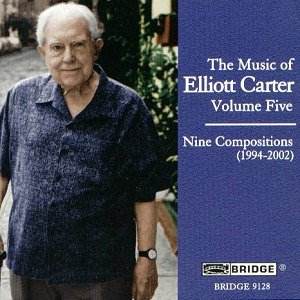Carter’s
muse continues to enthral in these works written during the last
decade. Five of these are premiere recordings – Steep Steps, the
remarkable Oboe Quartet, Figment No 2, Au Quai and Hiyoku. As
well as appearing in this guise played by their dedicatees the
works attest to the unbroken sense of concision and undimmed imagination
that Carter constantly demonstrates. The earlier four volumes
in this series have shown this well enough – now volume five illustrates
it with renewed triumph.
Of
Challenge and of Love is the earliest work here, dating from 1994;
the others are much more recent - Au Quai for instance was written
when Carter was ninety-four. Steep Steps (2001) was written for
and is here played by Carter’s friend Virgil Blackwell. This is
a sliver of a piece, lasting less than three minutes, but it exploits
the bass clarinet’s range with ceaseless mobility. Managing to
be simultaneously ruminative and conversationally loquacious it
exhibits a marked propensity for strong lower register work, which
Carter contrasts with the almost abstract writing for the upper
register. It ends indeed in the logic of the vertiginous heights
of the instrument’s range. The Two Diversions for piano were written
for The Carnegie Hall Millennium Piano Book, a gathering of pieces
by ten composers written in the hope of appealing to young musicians.
The First Diversion is a slow moving, complex Passacaglia-like
piece of no few technical demands whilst the Second seems to be
implicitly related to the first but is distinctly more animated.
The tied bass lends complex rhythmic patterns and defies expectations
as to its ultimate direction. Rosen plays it with seemingly effortless
understanding.
The
Oboe Quartet is a one movement, multi-sectional work of impressive
range. It opens with a Moderato in a rather brittle way, crabbed,
dogged but gradually the first violin’s lyricism and the cello’s
intensity impinge more and more powerfully on the musical argument.
Carter uses unison, or duet writing to advance the line. There’s
a most impressive tranquillo section that encapsulates in a brief
moment of time all Carter’s powers of melodic concision before
he unleashes an agitato of exceptionally busy writing. Slow and
faster sections contrast, the individual or duet voice against
the unison are imperatives of the quartet and, in the final section,
he gathers up his material in an act of powerful and cohesive
concentration.
Figment
No 2 (Remembering Mr Ives) was written for – as is performed here
by – cellist Fred Sherry. A brief piece it incorporates – or summons
up – Ivesian material from two favourite works, The Concord Sonata
and Hallowe’en. Au Quai is energetic, puckish and big. It has
opportunities for a wandering bassoon line (it’s written for the
unusual combination of bassoon and viola) but also finds time
for plenty of lyrical incident. Of Challenge and of Love (1994)
is, apart from Three Poems of Robert Frost, Carter’s only song
cycle and was premiered at the Aldeburgh Festival. Comprising
five poems by John Hollander (b 1926) the first, High on our Tower,
is a fizzing, dramatic, unrelenting contemporary setting – fractious
and driving. Under the Dome is more allusive, the bell like gnomic
restraint of the piano (this cycle has an exceptionally taxing
piano part, temperamentally as well as technically) occasionally
giving way to a severer curve of accompaniment. Am Klavier is
a cool and gentle piece that leads to the cycle’s heartland –
Quatrains from Harp Lake. Carter responds to the poem’s many ambiguities
and reflections, to the elusive, the half obscured but also to
the unvarnished loss and fear, with a variety of masterly means.
The soloist and no less the pianist evoke this through recitative,
dramatic chordal power and refraction. Soprano Tony Arnold and
Jacob Greenberg are vital and powerful interpreters (though she
has been rather backwardly recorded).
Figment
No 1, again played by Fred Sherry, is a solo of tremendous textual
oppositions and develops a real and unmistakeable internal contrastive
heat. Retrouvailles (2000) was written for performance at Pierre
Boulez’s 75th birthday concert in London. Alluding
to previous works written for Boulez it gains similarly, developing
weight through the use of contrastive devices. Finally, Hiyoku,
which is played by the two-clarinet team of Charles Neidrich and
Ayako Oshima – flitting and lively with some moments of reflective
intimacy along the way, it makes a fine addition to the repertoire.
And it makes a most fitting conclusion to this excellently produced
and recorded disc – splendid notes by the way by Malcolm MacDonald
– one which displays all Carter’s life-affirming complexity.
Jonathan
Woolf

![]() for
details
for
details